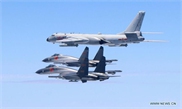 |
| Photo: VCG |
This can be defined by a series of its behaviors, including cracking down on Chinese tech giant Huawei and lobbying its allies to reject Huawei's 5G technology without solid proof; blacklisting Chinese companies for their alleged connections with so-called human rights issues in China's Xinjiang Uyghur Autonomous Region; declaring trade wars against the world; frequent military interventions in other countries' domestic affairs, claiming human rights are superior to sovereignty, and overthrowing governments of other countries.
Take trade wars. China is not the only target of the US. Washington has not even cut its allies some slack. Since 2018, not only Venezuela, Cuba, Ukraine, Turkey have been hit by US sanctions. Quite a few of traditional US allies, including Canada, Japan and South Korea, have also been sanctioned by the hegemonic power. Washington's goal is simple: To protect its domestic market and expand foreign markets to maximize global trade. This philosophy is also called "America First," and the US believes it is able to seek more interests through hegemonic means.
While the US is busy charging its "hegemonic tariff," it is putting the blame on China. The Atlantic published an article on Saturday entitled "The NBA-China Disaster Is a Stress Test for Capitalism," claiming "Chinese companies, furious over [US] public sympathy for Hong Kong, were swift in their vengeance. They suspended licensing agreements with the NBA." It then concluded that firms with business in China pay "values tariff."
This is deliberately confusing right from wrong. It shows the US does not respect Chinese sovereignty, while even wishing to impose its own values and political views on the Middle Kingdom.
Hegemonic measures are no longer effective. Trade lasts only when based on mutual respect, equality and mutual benefit. When US companies make money from around the world, they can achieve their goals smoothly only by complying with others' laws and respecting their public opinion.
However, Washington is now becoming increasingly narrow-minded and selfish, regarding mutual benefit as US losses. Worse, it is asking the world to compensate for its losses, urging others to make contributions to "America First" through political, financial and military means.
The Atlantic article noted "the partnership between the NBA and China, which is worth billions of dollars over the next decade, is now in jeopardy." This is exactly the consequence of the US obsessing over hegemony as well as the US obsessing with its so-called moral high ground.
China will not pay a penny for the US "hegemonic tariff," and will take countermeasures to take back what the US has seized from it. The chances of the US profiting from its hegemony are dwindling.
The key to making America great again is to boost the country's competitiveness and innovation, rather than slapping "hegemonic tariffs."
Source link
RELATED ARTICLES:
- US ‘navigational hegemony’ operations in S.China Sea will alienate all sides
- China firmly opposes US hegemonism over trading issue: FM spokesperson
Related posts:
The hegemonic anxiety of America First
 |
| The World Will Not Mourn the Decline of U.S. Hegemony |
American anti-China Hawks ignited the trade war, are Trump's advisors
China won't accept unequal trade deal
https://youtu.be/-XmC4RSOs2A Watch the start of the above video carefully. See the tall 6+ ft Caucasian guy easily grab the Policeman f...
https://youtu.be/zgTAWbH7fNY https://youtu.be/bxGdjMLrDho https://youtu.be/73bgozKmDUk https://youtu.be/caEjuzZSX-A Snap ...
As China continues to develop, so does its global influence. What would the future be like for South-East Asia with a ‘risen China’? Risi...













